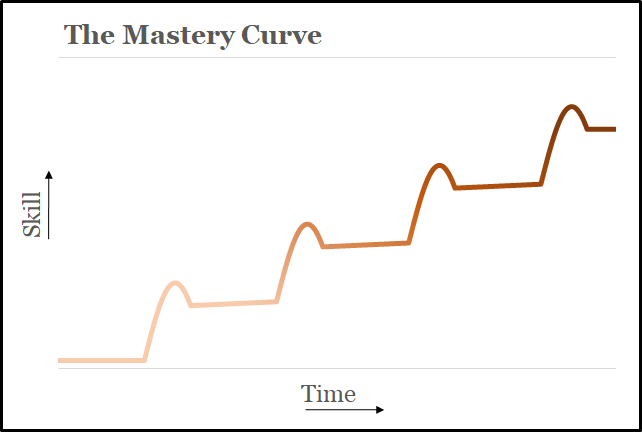If you have ever embarked upon learning something new, you might know the feeling of excitement changing to overwhelm and hitting a plateau. George Leonard's book "Mastery" is a how-to guide to mastery and addresses common obstacles people face when on the road to mastery. The book as a whole is a great anti-dote to quick-fix mentality. When I was studying classical piano for my bachelor's degree, this book was one of the things that kept me sane.
Here are three of my favorite insights from the book.
Thanks for reading Fallible Pianist! Subscribe for free to receive new posts and support my work.
1. Mastery is a road, not a destination
It is impossible to achieve mastery.
Mastery is something we can embark upon. It is a journey that we can decide to start, and keep going on. There is no final point where we have achieved everything, in that sense no matter where you are on the journey the logic of the situation is the same for a beginner as a virtuoso.
Either you stay on the journey or choose to end it.
2. Mastery is available to everyone
Have you learned your mother tongue?
That means you are a genius. Every person without severe brain damage is a genius. Therefore mastery is available to everyone. Moreover, since it is a journey, all that is fundamentally required is the ability to start and be on it.
The ability to start this journey is available to everyone. What can be difficult is the ability to stay on the journey. That is where "the plateau" comes in.
3 Loving the plateau, the antidote to the "quick-fix" mentality
Here is what Leonard calls "the mastery curve":

Learning happens in growth spurts followed by a plateau. This is natural, since learning is problem-solving, and finding the solutions can never follow a set schedule. If we already knew the solutions, we wouldn’t need to learn anything new. It can however feel tough when we hit a plateau after a growth spurt. If we go into a path of mastery with a quick-fix mindset. One where we imagine that things will progress linearly and without fail, we will quit when we hit the inevitable plateau. Instead of getting frustrated about the plateau we should start loving it. When Leonard was practicing aikido in his middle years he also became frustrated with the plateau at first. Then one time when he hit one he said to himself "Oh boy. Another plateau. Good. I can just stay on it and keep practicing. Sooner or later, there'll be another spurt".
That was the warmest moments on his journey.
Conclusion
If I feel overwhelmed or stuck at something, this books always helps me. It reassures me that I am in good company. A life of pursuing mastery is immensely satisfying. The world-famous cellist Pablo Casals was asked in his 90s “Why do you practice?”. His reply “Because I think I am making progress”. Mastery is truly a journey, George Leonards book is a great guide on that journey.
https://www.amazon.se/-/en/George-Leonard/dp/0452267560
Thanks for reading Fallible Pianist! Subscribe for free to receive new posts and support my work.